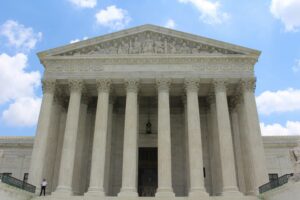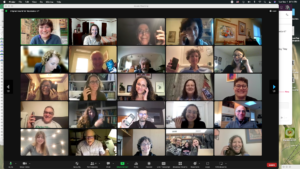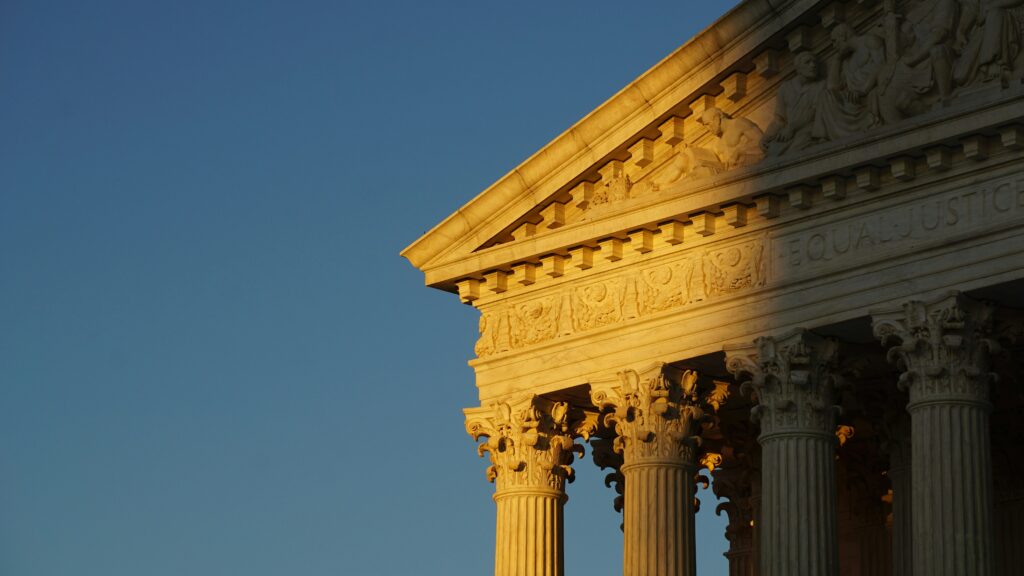The U.S. Supreme Court session, which wrapped up last week, covered a variety of topics, but made one thing abundantly clear: this Court is fundamentally changing the balance of power in our country – and endangering our chance for a just and livable future.
In the wake of some momentous decisions – characterized as “earthquakes” and “jolts to the legal system” – we’ll cut through the legalese and boil it down to what it means for the rest of us and the future of our planet.
Shifting power away from trained experts to unaccountable judges
In Loper Bright Enterprises v. Raimondo, the Supreme Court overturned the so-called Chevron doctrine, unsettling the balance of power by shifting executive authority – in the form of regulatory agencies like the Environmental Protection Agency (EPA) and the Food and Drug Administration –- over to the (unelected) courts.
In plain English: When Congress passes a law, federal agencies, staffed by career officials with years of experience, are charged with interpreting and implementing that law. In an increasingly complex and technical society and economy, we rely on these experts to understand and make clear rules for important but complicated issues. Think: power plant emissions, food safety, toxic chemicals.
This ruling weakens agencies (and, most importantly, experts) that have been charged with implementing federal laws intended to protect people and hands these crucial matters over to the hands of unelected judges. Who may know little or nothing about the issues. Who may be vulnerable to the sway of special interests.
In her dissent, Justice Elana Kagan lamented that the court had, in “one fell swoop,” given “itself exclusive power over every open issue — no matter how expertise-driven or policy-laden — involving the meaning of regulatory law.”
Stanford Law Professor Deborah Sivas, an environmental law expert, offers insights in this interview about its impact the climate crisis:
“Take climate policy: Congress has never enacted climate legislation and, given the extremely partisan nature of our current political system, is not likely to do so anytime in the near future. To address contemporary concerns, therefore, the EPA has turned largely to the Clean Air Act, which was enacted in 1970, long before climate change came onto the public radar.
“The Clean Act does not speak directly to greenhouse gas emissions or climate policy—that is, it is silent on those issues. So, the EPA has interpreted and applied various provisions of the statue to address climate issues. Courts will no longer be able to defer to the agency’s interpretation of the statute, setting the stage for the judiciary to more easily strike down climate regulations.”

Undercutting the federal government’s capacity to solve problems – including and especially the climate crisis
In a more unsung (but potentially just as destructive) move, the Supreme Court made a ruling that threatens longstanding agency regulations. The decision in the case of Corner Post, Inc. v. Board of Governors of the Federal Reserve System enables an “entity” (read: corporation) to challenge any regulation within six years of the entity’s formation – even if the regulation was established decades ago (think: bedrock environmental laws like the Clean Air and Clean Water Acts). This means that corporate polluters can regularly create new companies for the sole purpose of challenging environmental protections.
In her dissent, Justice Jackson wrote: “Any established government regulation about any issue — say, workplace safety, toxic waste, or consumer protection — can now be attacked by any new regulated entity within six years of the entity’s formation.”
Weakening the ability to protect people and curb pollution
Too many of the Court’s majority opinions lost sight of the fact that laws and regulations are intended to protect and improve people’s lives, now and for generations to come. This is especially true for historically marginalized groups, who often live alongside polluting facilities and have and will continue to experience the harmful impacts of the climate crisis first and worst.
One such case: Grants Pass v. Johnson, where the Majority’s opinion practically criminalizes homelessness. In her dissent, Justice Sotomayor drew the connection between climate change and increased vulnerability: “People become homeless for many reasons, including some beyond their control…Natural disasters also play a role, including in Oregon, where increasing numbers of people ‘have lost housing because of climate events such as extreme wildfires across the state, floods in the coastal areas, [and] heavy snowstorms.’”
Meanwhile in Ohio v. EPA, the Court’s majority brazenly put polluters over people. The decision paused EPA’s ability to limit air pollution, including from the coal-fired power plants contributing to the climate crisis, that blows from “upwind” to “downwind” states. Writing for the majority, Justice Gorsuch, even acknowledged that this policy, known as the “good neighbor rule,” would result in better air quality. Sadly, this ruling will cause more harm to communities – too often Black, Brown, Indigenous and other people of color – overburdened by the pollution.
Unelected but not inevitable
Do remember this: While the Justices are unelected, they are appointed and confirmed by people we DO elect.
In the face of the monumentally important 2024 election, we DO have the opportunity to address who is on this Court and will rule in future climate cases.
We can vote — and we can work to get out the vote to elect climate champions up and down the ballot..
From now until Election Day, we’ll be doing all we can to ensure that people who care about a just and livable future get to the polls and elect policymakers who share our values.
We’ll be doing it with the Chutzpah 2024 campaign.
Join us! The future is quite literally in the balance.


